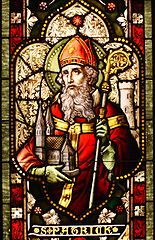
The Life And Writings Of Saint Patrick -Saint Patrick
I.—HIS ITINERANT SCHOOL
AS we have already seen, during the course of this work, St. Patrick had organised, from the beginning, a kind of itinerant or peripatetic school for the instruction of young clerics, destined for the ministry of the Irish Church. With far-seeing wisdom, he perceived that if his work in Hiberio was to endure, he should make provision for the training up of a native ministry, who would be qualified to continue and perfect the work of his own apostolate in Ireland. When the Saint came to Ireland in 432 he took along with him a large number (multitudo) of holy bishops, and priests, and deacons, and exorcists, and door-keepers, and readers, and youths also whom he had ordained—that is destined for the service of the Church, by having them, at least, duly tonsured.
The bishops and priests, as we know, he placed over various churches in Meath and Connaught during the nine years that he was preaching in those wide territories. Meantime, the school of ‘youths,’ whom he had brought with him to Ireland from Gaul and Britain, accompanied the Apostle on his missionary journeys, and received in that way an excellent training for the ministry. They became familiar with the Irish tongue; they were present at the catechetical instructions given by the Saint, or his assistant priests and prelates; they took a share, according to their respective orders, in public worship and the administration of the Sacraments; they were taught to read and chant the Divine Office with the clergy; and in this way they received an excellent practical training for the work of the ministry.
But from the beginning Patrick resolved to recruit this school with pupils of Irish birth. Benignus, from the banks of the Boyne, was one of the first to join it. Later on Guasacht, son of Milcho, Ailbe of Shancoe, Bron, MacRime, Fiacc of Sletty, and a host of other Irish boys were admitted to this itinerant school of Patrick, and trained in the way we have indicated above. They were excellent candidates for the ministry. Many of them belonged to the schools of the Bards or Brehons, and had not only a thorough knowledge of their own tongue, but had highly trained memories, and without doubt, were skilled in the use of letters and well able to read and write in the native fashion. Admission to this school soon became an object of ambition for the sons of the petty chieftains, for their parents and themselves soon perceived that to be head of a tribal church was not only desirable from a spiritual, but also from a temporal point of view.
The greatest difficulty found in practice was to provide books for the students of this school. The supply originally given to Patrick by St. Celestine, as old authors say, was soon exhausted; and then Patrick was forced—either himself or his attendant prelates—to write ‘alphabets’ for his pupils. The ‘alphabet’ was simply a catechism, or compendium of Christian doctrine, which was given to the young cleric to get by rote, and was of course, duly expounded for him by the teachers of the school, so that in a short time he became qualified to teach others all that he had learned himself.
In the same way, copies of the Lebar n Uird, or Liber Ordinis, that is the Ordo of the Mass, and also of the Lebar Baptismi, or Ritual, were multiplied and expounded for the students, who were thus enabled to celebrate Mass and administer the Sacraments under the guidance of their elders, until they were themselves deemed qualified to be placed over churches of their own. Sometimes when Patrick found a prelate specially qualified to instruct others he gave him the means of establishing a school of his own; as he did in the case of Bishop Mucna of Domnachmore, near Killala, to whom he gave the ‘Seven Books of the Law,’ with full authority to ‘ordain bishops and priests and deacons in that region.’ This Mucna was a brother of Cethech or Cethechus of Baslic, and was himself most probably educated in Gaul or Britain. We find reference made to Manchen the Master, or Mancen—so the Irish Tripartite has it—as dwelling there also; whence we may infer that Bishop Mucna was authorised by Patrick to establish a kind of theological seminary at Domnachmore ‘over the Wood of Focluth’ by the western sea, probably the first of the kind established in Ireland.

 Keep Site Running
Keep Site Running